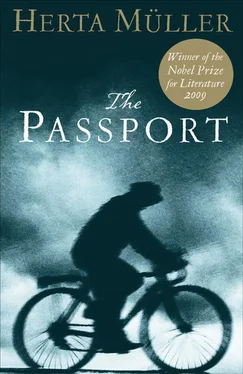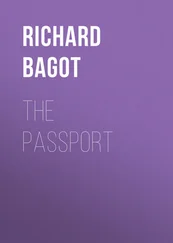Herta Müller - The Passport
Здесь есть возможность читать онлайн «Herta Müller - The Passport» весь текст электронной книги совершенно бесплатно (целиком полную версию без сокращений). В некоторых случаях можно слушать аудио, скачать через торрент в формате fb2 и присутствует краткое содержание. Город: London, Год выпуска: 2009, ISBN: 2009, Издательство: Serpent’s Tail, Жанр: Историческая проза, на английском языке. Описание произведения, (предисловие) а так же отзывы посетителей доступны на портале библиотеки ЛибКат.
- Название:The Passport
- Автор:
- Издательство:Serpent’s Tail
- Жанр:
- Год:2009
- Город:London
- ISBN:978-1-85242-139-7
- Рейтинг книги:3 / 5. Голосов: 1
-
Избранное:Добавить в избранное
- Отзывы:
-
Ваша оценка:
- 60
- 1
- 2
- 3
- 4
- 5
The Passport: краткое содержание, описание и аннотация
Предлагаем к чтению аннотацию, описание, краткое содержание или предисловие (зависит от того, что написал сам автор книги «The Passport»). Если вы не нашли необходимую информацию о книге — напишите в комментариях, мы постараемся отыскать её.
“[
] has the same clipped prose cadences as Nadirs, this time applied to evoke the trapped mentality of a man so desperate for freedom that he views everything through a temporal lens, like a prisoner staring at a calendar in his cell.”
—
“A swift, stinging narrative, fable-like in its stoic concision and painterly detail.”
—
The Passport — читать онлайн бесплатно полную книгу (весь текст) целиком
Ниже представлен текст книги, разбитый по страницам. Система сохранения места последней прочитанной страницы, позволяет с удобством читать онлайн бесплатно книгу «The Passport», без необходимости каждый раз заново искать на чём Вы остановились. Поставьте закладку, и сможете в любой момент перейти на страницу, на которой закончили чтение.
Интервал:
Закладка:
The previous summer, Windisch had been on his way home with two sacks of flour.
Windisch had knocked at a window. The mayor shone his torch through the curtain. “Why do you still knock?” said the mayor. “Put the flour in the yard. The gate is open.” His voice was asleep. That night, there was a thunderstorm. A flash of lightning struck the grass in front of the window. The mayor switched off his torch. His voice woke up and spoke more loudly. “Another five deliveries, Windisch,” said the mayor, “then the money at New Year. And at Easter you’ll have your passport.” There was a roll of thunder and the mayor looked up to the window. “Put the flour underneath the roof,” he said, “it’s going to rain.”
“Twelve deliveries since then, and ten thousand lei, and Easter is long past,” thinks Windisch. It’s a long time since he knocked on the window. He opens the gate. Windisch presses the sack to his stomach and puts it in the yard. Even when it’s not raining, Windisch puts the sack underneath the roof.
His bicycle is light. Windisch holds it close to him, as he wheels it along. When the bicycle is going through the grass, Windisch can’t hear his footsteps.
That night, all the windows had been dark. Windisch had stood in the long hallway. A flash of lightning tore open the earth. A roll of thunder pressed the house down into the crevice. Windisch’s wife didn’t hear the key turning in the lock.
Windisch had stood in the hall. The thunder was so far above the village, beyond the gardens, that there was a cold stillness in the night. The pupils in his eyes were cold. Windisch had the feeling that the night was going to shatter, that all at once it would be dazzlingly bright above the village. Windisch stood in the hall and knew that if he had not gone into the house, he would have seen, across all the gardens, the narrow end of all things and his own end everywhere.
Behind the door Windisch heard the stubborn, regular moaning of his wife. Like a sewing machine.
Windisch flung the door open. He switched on the light. His wife’s legs, raised on the sheet, were like open window sashes. They twitched in the light. Windisch’s wife opened her eyes wide. Her gaze was not dazzled by the light. It was merely fixed.
Windisch bent down. He unlaced his shoes. He looked beneath his arm at his wife’s thighs. He saw her pulling a slimy finger out of the hair. She didn’t know where to put the hand with the finger. She laid it on her naked stomach.
Windisch looked down at his shoes and said: “So that’s how it is with your bladder, my lady.” Windisch’s wife put the hand with that finger to her face. She pushed her legs down to the foot of the bed. She pressed them closer and closer together, until Windisch could see only a single leg and the two soles of her feet.
Windisch’s wife turned her face to the wall and wept loudly. She wept for a long time with the voice of her younger years. She wept briefly and softly with the voice of her own age. She whimpered three times with the voice of another woman. Then she was silent.
Windisch switched off the light. He climbed into the warm bed. He felt her slime, as if she had emptied her stomach into the bed.
Windisch heard sleep pressing her down far below this slime. Only her breath hummed. He was tired and empty. And far from all things. The sound of her breath seemed to be at the end of all things, at his own end.
That night her sleep was so distant, that no dream could find her.
BLACK SPOTS
The skinner’s windows are behind the apple tree. They are brightly lit. “He’s got his passport,” thinks Windisch. The windows glare and the glass is naked. The skinner has sold everything. The rooms are empty. “They’ve sold the curtains,” says Windisch to himself.
The skinner is leaning against the tiled stove. There are white plates on the floor. Cutlery is lying on the window sill. The skinner’s black coat is hanging on the door handle. The skinner’s wife bends over the large suitcases as she passes. Windisch can see her hands. They throw shadows against the empty walls of the room. They grow long and bend. Her arms are rippled like branches over water. The skinner is counting his money. He lays the bundles of notes in the pipes of the tiled stove.
The cupboard is a white rectangle, the beds are white frames. The walls in between are black patches. The floor slopes. The floor rises. It rises high against the wall. And stops at the door. The skinner is counting the second bundle of money. The floor will cover him. The skinner’s wife blows the dust from the grey fur cap. The floor will lift her to the ceiling. By the tiled stove, the clock has struck a long white patch against the wall. Windisch closes his eyes. “Time is at an end,” he thinks. He hears the white patch of the clock on the wall ticking and sees a clock-face of black spots. Time has no clock hand. Only the black spots are turning. They crowd together. They push themselves out of the white patch. Fall along the wall. They are the floor. The black spots are the floor in the other room.
Rudi is kneeling on the floor in the empty room. Before him coloured glass lies in long rows. In circles. Beside Rudi is the empty suitcase. A picture is hanging on the wall. It isn’t a picture. The frame is made of green glass. Inside the frame is frosted glass with red waves.
The owl flies over the gardens. Its cry is high. Its flight is deep. Its flight is full of night. “A cat,” thinks Windisch, “a cat that flies.”
Rudi holds a spoon of blue glass to his eye. The white of his eye grows large. His pupil is a wet, glistening sphere in the spoon. The floor washes colours to the edge of the room. The time from the other room beats waves. The black spots float along. The light bulb flickers. The light is torn. The two windows swim into one another. The two floors push the walls in front of them. Windisch holds his head in his hand. His pulse is beating in his head. His temple beats in his wrist. The floors lift themselves. They come closer, touch. They sink down into the crack. They will be heavy, and the earth will break. The glass will glow, will become a trembling abscess in the suitcase.
Windisch opens his mouth. He feels them growing in his face, the black spots.
THE BOX
Rudi is an engineer. He worked in a glass factory for three years. The glass factory is in the mountains.
During those three years the skinner only visited his son once. “I’m going to visit Rudi in the mountains for a week,” the skinner had said to Windisch.
The skinner came back after three days. He had ruddy cheeks from the mountain air and tired eyes from lack of sleep. “I couldn’t sleep there,” said the skinner. “I didn’t sleep a wink. I could feel the mountains in my head at night.”
“Everywhere you look,” explained the skinner, “there are mountains. On the way to the mountains are tunnels. They are black as night. The train goes through the tunnels. The whole mountain rattles in the train. You get a buzzing in your ears and throbbing in your head. First pitch black night, then broad daylight,” said the skinner, “and constantly alternating. It’s unbearable. Everyone sits and doesn’t even look out of the window. When it’s light, they read. They take care not to let the books slip from their knees. I had to be careful, not to touch them with my elbows. They leave their books open when it gets dark. I listened, I listened in the tunnels, to hear if they shut their books. I heard nothing. When it was light again, I looked at the books first and then at their eyes. The books were open and their eyes were shut. They opened their eyes after me. I tell you, Windisch,” said the skinner, “I felt proud every time, because I opened my eyes before them. I can sense the end of the tunnel. I’ve got that from Russia,” said the skinner. He held his hand to his forehead. “I have never experienced,” said the skinner, “so many rattling nights and so many bright days. At night, in bed, I heard the tunnels. They roared. Roared like the pit waggons in the Urals.”
Читать дальшеИнтервал:
Закладка:
Похожие книги на «The Passport»
Представляем Вашему вниманию похожие книги на «The Passport» списком для выбора. Мы отобрали схожую по названию и смыслу литературу в надежде предоставить читателям больше вариантов отыскать новые, интересные, ещё непрочитанные произведения.
Обсуждение, отзывы о книге «The Passport» и просто собственные мнения читателей. Оставьте ваши комментарии, напишите, что Вы думаете о произведении, его смысле или главных героях. Укажите что конкретно понравилось, а что нет, и почему Вы так считаете.












